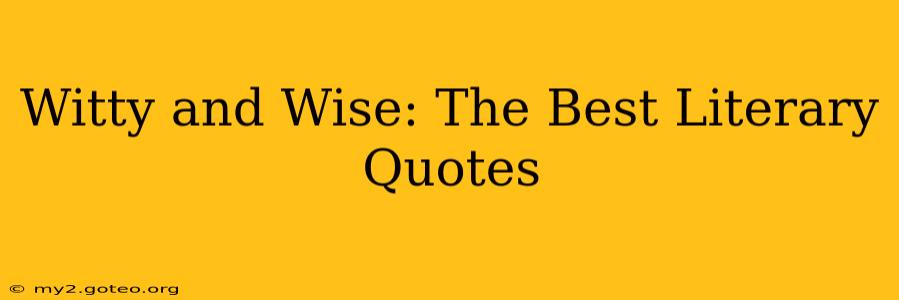Literature is a treasure trove of wisdom, wit, and profound observations about the human condition. From the sharpest satire to the most poignant poetry, great books offer quotable gems that resonate across generations. This exploration delves into some of the best literary quotes, examining their context, impact, and enduring relevance. Prepare to be inspired, challenged, and perhaps even a little amused.
What Makes a Literary Quote "Great"?
Before diving into the quotes themselves, let's consider what elevates a line of text from a simple sentence to a memorable quote. Several factors contribute:
- Brevity and Impact: The most effective quotes are often concise yet powerful, conveying a complex idea with remarkable efficiency.
- Universality: Great quotes speak to fundamental human experiences, transcending time and cultural boundaries. They resonate with readers because they touch upon something deeply relatable.
- Originality and Insight: A truly memorable quote offers a fresh perspective or a novel way of looking at a familiar concept. It challenges assumptions and stimulates thought.
- Literary Merit: The quote's placement within the larger work contributes to its impact. The surrounding text, character development, and narrative context all enrich the meaning and resonance of the quote.
Exploring Some of Literature's Most Enduring Quotes
Here are some literary quotes that have stood the test of time, categorized for easier browsing:
On Love and Relationships:
"The course of true love never did run smooth." — William Shakespeare, A Midsummer Night's Dream
This famous quote, despite its seemingly simplistic nature, encapsulates the complexities and challenges inherent in romantic relationships. Shakespeare's observation remains strikingly relevant centuries later, reminding us that love is rarely straightforward.
On Life's Uncertainties:
"The only constant in life is change." – Heraclitus (often misattributed to various authors, including Shakespeare)
While the precise origin is debated, the sentiment remains powerfully true. This quote acknowledges the ever-shifting nature of existence, encouraging us to embrace adaptation and fluidity.
On the Power of Words:
"The pen is mightier than the sword." — Edward Bulwer-Lytton, Richelieu; or, The Conspiracy
This iconic line highlights the potent influence of language and communication. Words can inspire, incite, persuade, and even destroy, wielding a power that surpasses physical force.
On the Pursuit of Knowledge:
"The more I learn, the more I realize how much I don't know." — Albert Einstein (often misattributed, but reflects a similar sentiment found in various works)
This quote underscores the humbling nature of intellectual pursuit. The accumulation of knowledge often reveals the vastness of what remains unknown, fostering a lifelong thirst for learning.
Frequently Asked Questions (FAQs) about Literary Quotes
What are some resources for finding more great literary quotes?
There are numerous online resources and books dedicated to compiling literary quotes. Websites such as Goodreads and Quote Investigator offer extensive collections, allowing you to search by author, theme, or keyword.
How can I use literary quotes effectively in my own writing?
Use literary quotes sparingly and purposefully. Choose quotes that directly relate to your topic and enhance your argument or narrative. Always cite the source appropriately.
Are there any websites that analyze the context and meaning of famous literary quotes?
Many academic websites and literary journals delve into the interpretation and analysis of literary quotes, offering detailed insights into their historical and cultural significance. Searching for specific quotes alongside terms like "literary analysis" or "critical interpretation" will yield relevant results.
Why are literary quotes so popular on social media?
Literary quotes resonate with people on social media because they offer a concise and impactful way to express complex emotions or ideas. They often provide a sense of shared understanding and intellectual connection among users.
Conclusion: The Enduring Power of Words
Literary quotes serve as enduring testaments to the power of language and the human experience. They offer profound insights, witty observations, and timeless wisdom that continue to inspire and challenge us today. By exploring these quotes and engaging with their rich contexts, we deepen our understanding of literature and our own lives.

